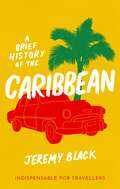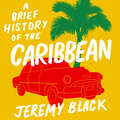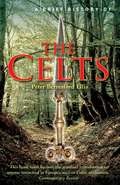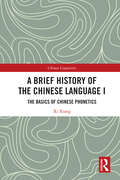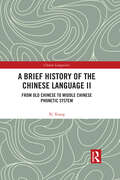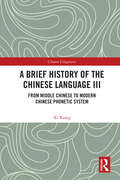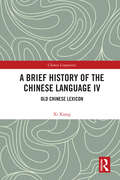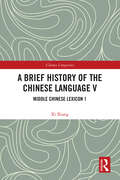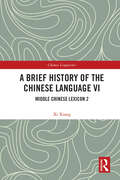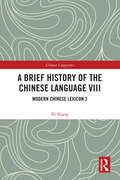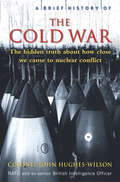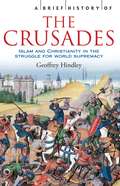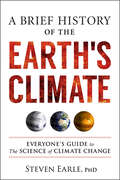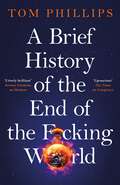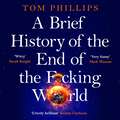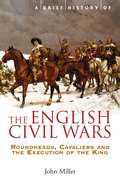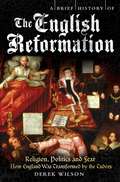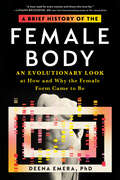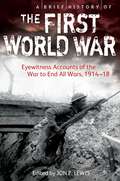- Table View
- List View
A Brief History of the Caribbean: Indispensable for Travellers (Brief Histories)
by Jeremy BlackA concise history of the Caribbean's long and fascinating history, from pre-contact civilisations to the present day This is a concise history, intended for travellers, but of inestimable value to anyone looking for an overview of the Caribbean and its mainland coastal states, with a focus on the past few centuries. The history of the Caribbean does not make much sense without factoring in the cities - Pensacola, New Orleans, Galveston - and the ambitions of the states on its continental shores, notably the United States. This account is grounded in a look at the currents and channels of the sea, and its constraints, such as the Mosquito Coast, followed by the history of 'pre-contact' civilisations, focusing on the Maya and the Toltec Empire.With the arrival of the Europeans, from the late fifteenth century to the early years of the seventeenth century, the story becomes one of exploration, conquest and settlement. Black charts the rise of slave economies and the Caribbean's place in the Atlantic world, also the arrival of the English - Hawkins and Drake - to challenge the Spanish. He examines the sugar and coffee slave economies of the English, French, Spanish and Dutch, also the successful rebellion in Haiti in the eighteenth century, and how the West Indies were further transformed by the Louisiana Purchase, the American conquest of Florida and the incorporation of Texas.He discusses the impact of Bolivar's rebellion in Spanish America, the end of slavery in the British Caribbean, and war between Mexico and America; also the defeat of the South by the Union, the American takeover of the Panama Canal project from France, and the Spanish-American War.The first half of the twentieth century focuses on growing US power: intervention in Mexico, Honduras, Nicaragua, Panama, Haiti and the Dominican Republic; Cuba as an American protectorate, and civil wars in Mexico.The Cold War brought new tensions and conflict to the region, but the same period also saw the rise of the leisure industry. The last part of the book looks at the Caribbean today - political instability in Venezuela and Colombia, crime in Mexico, post-Castro Cuba - and the region's future prospects.
A Brief History of the Caribbean: Indispensable for Travellers (Brief Histories)
by Jeremy BlackA concise history of the Caribbean's long and fascinating history, from pre-contact civilisations to the present day This is a concise history, intended for travellers, but of inestimable value to anyone looking for an overview of the Caribbean and its mainland coastal states, with a focus on the past few centuries. The history of the Caribbean does not make much sense without factoring in the cities - Pensacola, New Orleans, Galveston - and the ambitions of the states on its continental shores, notably the United States. This account is grounded in a look at the currents and channels of the sea, and its constraints, such as the Mosquito Coast, followed by the history of 'pre-contact' civilisations, focusing on the Maya and the Toltec Empire.With the arrival of the Europeans, from the late fifteenth century to the early years of the seventeenth century, the story becomes one of exploration, conquest and settlement. Black charts the rise of slave economies and the Caribbean's place in the Atlantic world, also the arrival of the English - Hawkins and Drake - to challenge the Spanish. He examines the sugar and coffee slave economies of the English, French, Spanish and Dutch, also the successful rebellion in Haiti in the eighteenth century, and how the West Indies were further transformed by the Louisiana Purchase, the American conquest of Florida and the incorporation of Texas.He discusses the impact of Bolivar's rebellion in Spanish America, the end of slavery in the British Caribbean, and war between Mexico and America; also the defeat of the South by the Union, the American takeover of the Panama Canal project from France, and the Spanish-American War.The first half of the twentieth century focuses on growing US power: intervention in Mexico, Honduras, Nicaragua, Panama, Haiti and the Dominican Republic; Cuba as an American protectorate, and civil wars in Mexico.The Cold War brought new tensions and conflict to the region, but the same period also saw the rise of the leisure industry. The last part of the book looks at the Caribbean today - political instability in Venezuela and Colombia, crime in Mexico, post-Castro Cuba - and the region's future prospects.
A Brief History of the Celts
by Peter EllisFor centuries the Celts held sway in Europe. Even after their conquest by the Romans, their culture remained vigorous, ensuring that much of it endured to feed an endless fascination with Celtic history and myths, artwork and treasures. A foremost authority on the Celtic peoples and their culture, Peter Berresford Ellis presents an invigoration overview of their world. With his gift for making the scholarly accessible, he discusses the Celts' mysterious origins and early history and investigates their rich and complex society. His use of recently uncovered firnds brings fascinating insights into Celtic kings and chieftains, architecture and arts, medicine and religions, myths and legends, making this esesntial reading for any search for Europe's ancient past.
A Brief History of the Celts (Brief Histories)
by Peter EllisFor centuries the Celts held sway in Europe. Even after their conquest by the Romans, their culture remained vigorous, ensuring that much of it endured to feed an endless fascination with Celtic history and myths, artwork and treasures. A foremost authority on the Celtic peoples and their culture, Peter Berresford Ellis presents an invigoration overview of their world. With his gift for making the scholarly accessible, he discusses the Celts' mysterious origins and early history and investigates their rich and complex society. His use of recently uncovered firnds brings fascinating insights into Celtic kings and chieftains, architecture and arts, medicine and religions, myths and legends, making this esesntial reading for any search for Europe's ancient past.
A Brief History of the Chinese Language I: The Basics of Chinese Phonetics (Chinese Linguistics)
by Xi XiangAs the first volume of a multi-volume set on Chinese phonetics, this book gives a full picture of the historical development of the Chinese language and studies the phonetics of the early form of Chinese, i.e. Old Chinese.Chinese language history is generally split into three phases: 1) Old Chinese, the form of the Chinese language spoken between the 18th century BC and the 3rd century AD, 2) Middle Chinese, between the 4th century AD to around the 12th century AD, and 3) Modern Chinese, since the 13th century. In this volume, the author first introduces basic issues in Chinese language study, including research objectives, methodology, existing scholarship, periodization, and the distinctive linguistic characteristics of each period. The core chapters then describe and analyze the phonetical systems of Old Chinese, covering the initials system and related eight aspects, two types of rhyme groups, ancient finals, and the tonal system.This comprehensive groundwork on Chinese phonetical history will be a must read for scholars and students studying Chinese language, linguistics and especially for those wishing to become acquainted with Old Chinese phonetics.
A Brief History of the Chinese Language II: From Old Chinese to Middle Chinese Phonetic System (Chinese Linguistics)
by Xi XiangAs the second volume of a multi-volume set on Chinese phonetics, this book examines the phonetical systems of Middle Chinese and phonetical changes from Old Chinese to Middle Chinese.Chinese language history is generally split into three phases: 1) Old Chinese, the form of the Chinese language spoken between the 18th century BC and the 3rd century AD, 2) Middle Chinese, between the 4th century AD to around the 12th century AD, and 3) Modern Chinese, since the 13th century. This volume studies the phonological system of Middle Chinese, including the initials system, finals system, and tonal system, examining the evolution of these systems from the period of Old Chinese to that of Middle Chinese.This comprehensive groundwork on Chinese phonetical history will be a must read for scholars and student studying Chinese language, linguistics and especially for beginning learners of Middle Chinese phonetics.
A Brief History of the Chinese Language III: From Middle Chinese to Modern Chinese Phonetic System (Chinese Linguistics)
by Xi XiangAs the third volume of a multi-volume set on Chinese phonetics, this book examines the phonetical system of Modern Chinese and phonetical changes from Middle Chinese to Modern Chinese.Chinese language history is generally split into three phases: (1) Old Chinese, the form of the Chinese language spoken between the 18th century BCE and the 3rd century CE, (2) Middle Chinese, between the 4th century AD to around the 12th century CE, and (3) Modern Chinese, since the 13th century. This volume studies the phonetical systems of Modern Chinese, including the initials system, vowel final system, nasal final system, entering final system, and tonal system. The author discusses the distinct change of these systems from the period of Middle Chinese to that of Modern Chinese and studies the formation of the standard pronunciation of the common language of the modern Han nation.This comprehensive groundwork on Chinese phonetical history will be a must read for scholars and student studying Chinese language, linguistics, and especially for beginning learners of Modern Chinese phonetics.
A Brief History of the Chinese Language IV: Old Chinese Lexicon (Chinese Linguistics)
by Xi XiangAs the fourth volume of a multi-volume set on the Chinese language, this book studies the lexical system of Old Chinese and the development of different types of lexicons during the period. Focusing on lexicons in Old Chinese, the early form of the Chinese language used between the 18th century BCE and the 3rd century CE, this volume first introduces the methods of word formation in Old Chinese by analyzing words inscribed in oracle bones of the Shang Dynasty. Illustrated with examples, it then examines the lexical features of Old Chinese and explores the progress and evolutionary features of monosyllabic words, polysyllabic words, lexical meanings, synonyms, and idioms and proverbs over the course of the volume.This comprehensive groundwork on Chinese lexical history is a must-read for scholars and students studying ancient Chinese language, linguistics, and especially for beginning learners of the Old Chinese lexicon.
A Brief History of the Chinese Language V: Middle Chinese Lexicon 1 (Chinese Linguistics)
by Xi XiangAs the fifth volume of a multi-volume set on the Chinese language, this book studies the development of monosyllables and polysyllables in Middle Chinese and the overall evolution of lexical meanings during the period.Focusing on lexicons in Middle Chinese, the Chinese language used between the 4th century AD and the 12th century AD, the book first introduces the monosyllabic neologisms of Middle Chinese, including characters and words derived from Old Chinese lexicons and those newly created. It then examines the development of polysyllabic words in Middle Chinese, ranging from single morpheme words, tautologies and compound words. The final chapter discusses the changes and extension of word meanings in medieval Chinese.Illustrated with abundant examples, this comprehensive groundwork on Chinese lexical history will be a must read for scholars and students studying ancient Chinese language, linguistics and especially for beginning learners of the Middle Chinese lexicon.
A Brief History of the Chinese Language VI: Middle Chinese Lexicon 2 (Chinese Linguistics)
by Xi XiangAs the sixth volume of a multi-volume set on the Chinese language, this book studies the influence of foreign culture on Middle Chinese lexicon and the development of synonyms, idioms and proverbs during the period.Focusing on lexicons in Middle Chinese, the middle form of the Chinese language used between the 4th century AD and the 12th century AD, this book first analyzes loanwords in Middle Chinese, a product of cultural exchange with western regions on the silk road and the impact of Buddhism. It then discusses the differences in meaning between monosyllables and polysyllables. The final chapter describes enriching idioms and proverbs and the major sources of words, including classical works, Buddhist texts and the spoken language.Illustrated with abundant examples, this comprehensive groundwork on Chinese lexical history will be a must read for scholars and students studying ancient Chinese language, linguistics and especially for beginning learners of the Middle Chinese lexicon.
A Brief History of the Chinese Language VIII: Modern Chinese Lexicon 2 (Chinese Linguistics)
by Xi XiangAs the final volume of a multi-volume set on the Chinese language, this book studies the Western and Japanese influence on the lexicon of Modern Chinese, lexical developments in synonyms, idioms and proverbs in modern times, and lexical developments in contemporary times.This volume first introduces the influence of foreign cultures on the modern Chinese lexicon with an emphasis on loanwords from Japanese and Indo-European languages. It then discusses the synonyms, idioms and proverbs of Modern Chinese, elucidating their evolution, sources and composition. The final part centers on the development of the Chinese lexicon after the May 4 Movement in 1919, marking the beginning of the contemporary phase of the Chinese language. The author analyses trends and types of neologisms and loanwords and analyzes the blend of Mandarin and dialect words as well as the necessity of lexical standardization.Illustrated with abundant examples, this comprehensive groundwork on Chinese lexical history will be a must read for scholars and students studying modern Chinese language, linguistics and especially for beginning learners of modern and contemporary Chinese lexicon.
A Brief History of the Cold War
by John Hughes-WilsonThe Cold War was an undeclared war, fought silently and carefully between ideological opponents armed with the most fearsome weapons mankind has ever seen. Hughes-Wilson takes a cool look at this war, from the Bolshevik Revolution of 1917 to the collapse of the Berlin Wall in 1989 and the dissolution of the USSR thereafter. He examines the suspicion and paranoia -- on both sides -- of the greatest stand-off in history. Written by one of Britain's leading, popular, military historians, this book makes accessible for the first time one of the key periods to shape our world.
A Brief History of the Cold War (Brief Histories)
by Colonel John Hughes-WilsonThe Cold War was an undeclared war, fought silently and carefully between ideological opponents armed with the most fearsome weapons mankind has ever seen. Hughes-Wilson takes a cool look at this war, from the Bolshevik Revolution of 1917 to the collapse of the Berlin Wall in 1989 and the dissolution of the USSR thereafter. He examines the suspicion and paranoia -- on both sides -- of the greatest stand-off in history. Written by one of Britain's leading, popular, military historians, this book makes accessible for the first time one of the key periods to shape our world.
A Brief History of the Crusades
by Geoffrey HindleyWhy did the medieval Church bless William of Normandy's invasion of Christian England in 1066 and authorise cultural genocide in Provence? How could a Christian army sack Christian Constantinople in 1204? Why did thousands of ordinary men and women, led by knights and ladies, kings and queens, embark on campaigns of fanatical conquest in the world of Islam? The word 'Crusade' came later, but the concept of a 'war for the faith' is an ancient one. Geoffrey Hindley instructively unravels the story of the Christian military expeditions that have perturbed European history, troubled Christian consciences and embittered Muslim attitudes towards the West. He offers a lively record of the Crusades, from the Middle East to the pagan Baltic, and fascinating portraits of the major personalities, from Godfrey of Bouillon, the first Latin ruler of Jerusalem, to Etienne, the visionary French peasant boy who inspired the tragic Children's Crusade. Addressing questions rarely considered, Hindley sheds new light on pressing issues surrounding religious division and shows how the Crusades have helped to shape the modern world and relations between Christian and Muslim countries to this day.
A Brief History of the Crusades (Brief Histories)
by Geoffrey HindleyWhy did the medieval Church bless William of Normandy's invasion of Christian England in 1066 and authorise cultural genocide in Provence? How could a Christian army sack Christian Constantinople in 1204? Why did thousands of ordinary men and women, led by knights and ladies, kings and queens, embark on campaigns of fanatical conquest in the world of Islam? The word 'Crusade' came later, but the concept of a 'war for the faith' is an ancient one. Geoffrey Hindley instructively unravels the story of the Christian military expeditions that have perturbed European history, troubled Christian consciences and embittered Muslim attitudes towards the West. He offers a lively record of the Crusades, from the Middle East to the pagan Baltic, and fascinating portraits of the major personalities, from Godfrey of Bouillon, the first Latin ruler of Jerusalem, to Etienne, the visionary French peasant boy who inspired the tragic Children's Crusade. Addressing questions rarely considered, Hindley sheds new light on pressing issues surrounding religious division and shows how the Crusades have helped to shape the modern world and relations between Christian and Muslim countries to this day.
A Brief History of the Earth's Climate: Everyone's Guide to The Science of Climate Change
by Steven Earle“Give[s] . . . policymakers and concerned citizens a more thorough understanding of climate science and renewed conviction . . . on leaving fossil fuels behind.” —Tom Green, Senior Climate Policy Advisor, David Suzuki FoundationA Brief History of the Earth’s Climate is an accessible guide to the natural evolution of the Earth’s climate over 4.6 billion years, and how and why human-caused global warming is different and much more dangerous.Richly illustrated chapters cover the major historical climate change processes including evolution of the sun, plate motions and continental collisions, volcanic eruptions, changes to major ocean currents, Earth’s orbital variations, sunspot variations, and short-term ocean current cycles. There is also an overview of the implications of the COVID pandemic for climate change. Content includes:Understanding natural geological processes that shaped the climateHow human impacts are now rapidly changing the climateTipping points and the unfolding climate crisisWhat we can do to limit the damage to the planet and ecosystemsCountering climate myths peddled by climate change science deniers.A Brief History of the Earth’s Climate is essential reading for everyone who is looking to understand what drives climate change, counter skeptics and deniers, and take action on the climate emergency.“Earle understands the big climate picture and paints it with exceptional clarity.” —James Hansen, director, Climate Science, Awareness and Solutions, Columbia University Earth InstituteSteven Earle’s innate story-telling ability, coupled with his remarkable talent for making complex scientific information accessible, makes this page-turner a must-read for anyone seeking to understand the Earth’s climate system.” —Andrew Weaver, University of Victoria, lead author, Intergovernmental Panel on Climate Change
A Brief History of the End of the F*cking World: The hilarious and fascinating new book from the international bestselling author of HUMANS
by Tom PhillipsDo you feel like we're living in the end times? Does it seem like everything is on fire, and one disaster follows another? Here's a small comfort: you're not the first to feel that way. If there's one thing that people throughout history have agreed on, it's that history wasn't going to be around for much longer.This book is about the apocalypse, and how humans have always believed it to be very f*cking nigh. Across thousands of years, we'll meet weird cults, failed prophets and mass panics, holy warriors leading revolts in anticipation of the last days, and suburbanites waiting for aliens to rescue them from a doomed Earth. We'll journey back to the 'worst period to be alive', as the world reeled from a simultaneous pandemic and climate crisis. And we'll look to the future to ask the unnerving question: how might it all end?But it's also a book about how we live in a world where catastrophe is always looming - whether it's a madman with a nuclear button or the slow burn of environmental collapse. Because when we talk about the end of the world, what we really mean is the end of our world. Our obsession with doomsday is really about change: our fear of it, and our desire for it, and how - ultimately - we can find hope in it.Praise for the Brief History series:'Uproarious . . . Abundant good humour' The Times'Witty, entertaining and slightly distressing... You should probably read it' Sarah Knight, author of The Life-Changing Magic of Not Giving a F*ck'Brilliant. Utterly, utterly brilliant' Jeremy Clarkson'Very funny' Mark Watson'Both readable and entertaining' Telegraph
A Brief History of the End of the F*cking World: The hilarious and fascinating new book from the international bestselling author of HUMANS
by Tom PhillipsDo you feel like we're living in the end times? Does it seem like everything is on fire, and one disaster follows another? Here's a small comfort: you're not the first to feel that way. If there's one thing that people throughout history have agreed on, it's that history wasn't going to be around for much longer.This book is about the apocalypse, and how humans have always believed it to be very f*cking nigh. Across thousands of years, we'll meet weird cults, failed prophets and mass panics, holy warriors leading revolts in anticipation of the last days, and suburbanites waiting for aliens to rescue them from a doomed Earth. We'll journey back to the 'worst period to be alive', as the world reeled from a simultaneous pandemic and climate crisis. And we'll look to the future to ask the unnerving question: how might it all end?But it's also a book about how we live in a world where catastrophe is always looming - whether it's a madman with a nuclear button or the slow burn of environmental collapse. Because when we talk about the end of the world, what we really mean is the end of our world. Our obsession with doomsday is really about change: our fear of it, and our desire for it, and how - ultimately - we can find hope in it.Praise for the Brief History series:'Uproarious . . . Abundant good humour' The Times'Witty, entertaining and slightly distressing... You should probably read it' Sarah Knight, author of The Life-Changing Magic of Not Giving a F*ck'Brilliant. Utterly, utterly brilliant' Jeremy Clarkson'Very funny' Mark Watson'Both readable and entertaining' Telegraph
A Brief History of the End of the F*cking World: The hilarious and fascinating new book from the international bestselling author of HUMANS (Brief Histories Series)
by Tom PhillipsDo you feel like we're living in the end times? Does it seem like everything is on fire, and one disaster follows another? Here's a small comfort: you're not the first to feel that way. If there's one thing that people throughout history have agreed on, it's that history wasn't going to be around for much longer.This book is about the apocalypse, and how humans have always believed it to be very f*cking nigh. Across thousands of years, we'll meet weird cults, failed prophets and mass panics, holy warriors leading revolts in anticipation of the last days, and suburbanites waiting for aliens to rescue them from a doomed Earth. We'll journey back to the 'worst period to be alive', as the world reeled from a simultaneous pandemic and climate crisis. And we'll look to the future to ask the unnerving question: how might it all end?But it's also a book about how we live in a world where catastrophe is always looming - whether it's a madman with a nuclear button or the slow burn of environmental collapse. Because when we talk about the end of the world, what we really mean is the end of our world. Our obsession with doomsday is really about change: our fear of it, and our desire for it, and how - ultimately - we can find hope in it.Praise for the Brief History series:'Uproarious . . . Abundant good humour' The Times'Witty, entertaining and slightly distressing... You should probably read it' Sarah Knight, author of The Life-Changing Magic of Not Giving a F*ck'Brilliant. Utterly, utterly brilliant' Jeremy Clarkson'Very funny' Mark Watson'Both readable and entertaining' Telegraph
A Brief History of the English Civil Wars: Roundheads, Cavaliers and the Execution of the King (Brief Histories)
by Professor John MillerMiller provides a clear and comprehensible narrative, a coherent and accurate synthesis, intended as a guide for students and the general reader to an extremely complex period in British history. His aim is to help readers avoid getting lost in a maze of detail and rather to maintain a grasp of the big picture. Although the English Civil War is usually seen, in England at least, as a conflict between two sides, it involved the Scots, the Irish and the army and the people of England, especially London. At some points, events occurred and perspectives changed with such disorienting rapidity that even those who lived through these events were confused as to where they stood in relation to one another.As the 1640s wore on, events unfolded in ways which the participants had not expected and in many cases did not want. Hindsight might suggest that everything led logically to the trial and execution of the king, but these were in fact highly improbable outcomes.Since the 1980s, a 'three kingdoms' approach has become almost compulsory, but Miller's focus is unashamedly on England. Events in Scotland and Ireland are covered only insofar as they had an impact on events in England.
A Brief History of the English Civil Wars: Roundheads, Cavaliers and the Execution of the King (Brief History Ser.)
by John MillerThe English Civil War is one of the most hotly contested areas of English History and John Miller is one of the experts on the period. Amid dramatic accounts of the key battles and confrontations, Miller explores what triggered the initial conflict between crown and parliament and how this was played out in England, Scotland and Ireland in the lead-up to war. As the war developed, personalities and innovations on the battlefield became increasingly important, culminating in the rise of Oliver Cromwell and the radical New Model Army. The wars changed the political, social, religious and intellectual landscape of the country for ever. Using a lifetime's knowledge and study on the period, John Miller brings this extraordinary turning point in British history to life.
A Brief History of the English Reformation
by Derek WilsonReligion, politics and fear: how England was transformed by the Tudors.The English Reformation was a unique turning point in English history. Derek Wilson retells the story of how the Tudor monarchs transformed English religion and why it still matters today. Recent scholarly research has undermined the traditional view of the Reformation as an event that occurred solely amongst the elite. Wilson now shows that, although the transformation was political and had a huge impact on English identity, on England's relationships with its European neighbours and on the foundations of its empire, it was essentially a revolution from the ground up. By 1600, in just eighty years, England had become a radically different nation in which family, work and politics, as well as religion, were dramatically altered.
A Brief History of the English Reformation (Brief Histories)
by Mr Derek WilsonReligion, politics and fear: how England was transformed by the Tudors.The English Reformation was a unique turning point in English history. Derek Wilson retells the story of how the Tudor monarchs transformed English religion and why it still matters today. Recent scholarly research has undermined the traditional view of the Reformation as an event that occurred solely amongst the elite. Wilson now shows that, although the transformation was political and had a huge impact on English identity, on England's relationships with its European neighbours and on the foundations of its empire, it was essentially a revolution from the ground up. By 1600, in just eighty years, England had become a radically different nation in which family, work and politics, as well as religion, were dramatically altered. Praise for Derek Wilson:'Stimulating and authoritative.' John Guy.'Masterly. [Wilson] has a deep understanding of . . . characters, reaching out across the centuries.' Sunday Times.
A Brief History of the Female Body: An Evolutionary Look at How and Why the Female Form Came to Be
by Dr. Deena EmeraFrom breasts and orgasms to periods, pregnancies, and menopause—A Brief History of the Female Body is a fascinating science book explaining the mysteries of the female body through an evolutionary lens.Let's face it: The female body is an enigma. For teenagers first experiencing their periods, the monthly arrival of mood swings and cramps can be agonizing and inconvenient. With pregnancy—perhaps the most miraculous of bodily events—comes countless potential complications, including high blood pressure, diabetes, premature birth, and postpartum depression. And menopause is equally mystifying. Why do females lose their fertility over time and experience the notorious side effects—like hot flashes, weight gain, and hair loss—while males maintain their fertility forever?Evolutionary geneticist and educator Dr. Deena Emera has spent much of her career studying the evolution of female reproduction. A Brief History of the Female Body draws on her vast expertise as a biologist, her experience as a mother of four children, and her love of teaching to look far into our evolutionary past, illuminating how and, more importantly, why the female form has transformed over millions of years and its effects on women's health.
A Brief History of the First World War: Eyewitness Accounts of the War to End All Wars, 1914-18
by Jon E. LewisEven 100 years on from the First World War it haunts us still. No other conflict has revealed so dramatically the senselessness of war, and none has shaped the modern world to the same extent, from its impact on the Russian Revolution and the rise of Hitler to the final break-up of the British Empire and the supremacy of America. These compelling eyewitness accounts - over 180 of them - of the War to End All Wars cover every facet of the war, from the Flanders trenches to the staffrooms of the Imperial German Army, from T. E. Lawrence ('Lawrence of Arabia') in the desert to German figher ace the Red Baron in the air, and from English Land Girls to German U-boat crews in the North Atlantic. There are contributions from all combatant nations, including the UK, USA, France, Germany, Canada, Italy, Australia, Russia, Serbia, and India and the book includes a detailed timeline and maps.
